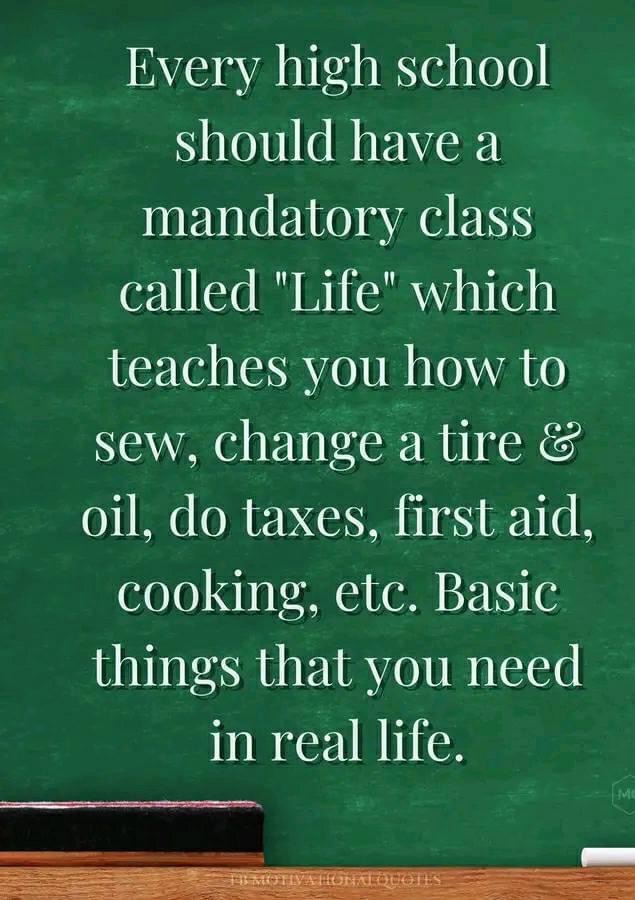In today’s fast-paced world, there’s a growing realization that high schools should equip students not only with academic knowledge but also with practical life skills. A mandatory class, aptly named “Life,” could be the solution, teaching essential skills like sewing, changing a tire and oil, doing taxes, first aid, cooking, and more. Such a curriculum would prepare students for the realities of adult life, filling a crucial gap in traditional education.

Essential Life Skills for Young Adults
Financial Literacy
Understanding taxes, budgeting, and managing finances are crucial skills that are often overlooked in traditional high school curricula. A “Life” class could demystify the process of filing taxes, teach the importance of saving and investing, and provide practical tips on managing personal finances.
Basic Home and Auto Maintenance
Skills like changing a tire, performing basic oil maintenance, and understanding the workings of household appliances are invaluable. These lessons can foster independence and confidence in young adults, saving them time and money in the future.
First Aid and Emergency Response
First aid training is essential for everyone, regardless of their career path. Knowing how to respond in an emergency can save lives. This training can include CPR, wound care, and how to act in various emergency situations.
Domestic Skills
Cooking, cleaning, and sewing are basic domestic skills that everyone should possess. Cooking classes can promote healthier eating habits, while sewing can be both a practical skill and a creative outlet.
Job and Career Preparation
Skills like resume writing, job interviewing, and professional communication are critical for entering the workforce. These practical lessons can give students a significant advantage in their job searches and early careers.
The Benefits of a “Life” Class
Preparing for Real-World Challenges
A “Life” class would prepare students for the challenges of adult life, making the transition smoother and less intimidating.
Promoting Independence and Self-Reliance
By equipping students with these skills, schools can foster independence, self-reliance, and confidence in their ability to handle life’s various tasks.
Long-Term Financial and Personal Benefits
The knowledge gained from a “Life” class can lead to long-term financial savings and personal well-being. For example, understanding basic car maintenance can prevent costly repairs, and cooking skills can lead to healthier and more economical eating habits.
Introducing a mandatory “Life” class in high schools is a step towards a more holistic approach to education. It acknowledges that academic knowledge, while important, needs to be complemented with practical life skills. Such a class would not only prepare students for the realities of adult life but also empower them to navigate the world with confidence and independence.
Men Guiding Men offers a range of articles that delve into various aspects of life, challenges, and skills that are essential for modern men. Here are some articles from their site that complement the idea of a mandatory “Life” class in high schools:
- Seeking Solitude: The Modern Man’s Quest for Peace in the Bathroom This article explores the importance of finding moments of tranquility in today’s fast-paced world. It aligns with the concept of a “Life” class by emphasizing the need for personal well-being and mental health. Read more.
- How to Throw a Football in a Spiral: A Beginner’s Guide Learning practical skills like throwing a football is part of the broader spectrum of life skills. This guide not only teaches the technique but also the value of physical activity and sportsmanship. Read more.
- Teach Your Boys to Be Men: Don’t Rely on Schools to Instill Values This article emphasizes the importance of teaching values and life skills at home, complementing formal education. It highlights the role of parents in instilling practical life skills and values in their children. Read more.
These articles from Men Guiding Men provide valuable insights into various life skills and challenges, offering perspectives that can enhance the concept of a “Life” class in high schools. For more information on these and other topics related to men’s lifestyle and personal development, visit Men Guiding Men.
Addressing the Absence of Father Figures and Its Impact on Life Skills
In recent times, there has been a noticeable trend of men feeling left behind, particularly due to the absence of father figures in many households. This gap significantly affects the transmission of essential life skills and values from one generation to the next.
The Role of Fathers in Skill Transmission
Traditionally, fathers have played a crucial role in teaching practical life skills to their children. Skills like basic home repairs, car maintenance, financial management, and even softer skills like emotional resilience and ethical decision-making often came from paternal guidance.
Impact of Father Absence
The absence of fathers can lead to a gap in learning these vital skills. Young men, in particular, may find themselves ill-equipped to handle the practicalities of adult life. This absence not only affects skill acquisition but can also lead to a lack of positive male role models, impacting their overall development and self-esteem.
The Need for Comprehensive Education
The absence of father figures reinforces the need for a comprehensive educational approach, like the proposed “Life” class in high schools. Such a class would provide all students, regardless of their home situation, with equal opportunities to learn essential life skills.
Broader Societal Support
In addition to educational initiatives, there is a need for broader societal support systems. Mentorship programs, community workshops, and online resources can help fill the void left by absent fathers. These platforms can offer guidance and support to young men navigating the complexities of adulthood.
Encouraging Community and Peer Learning
Fostering a community environment where men can learn from each other is also vital. Peer-to-peer learning and support groups can provide spaces for sharing knowledge and experiences, helping men to acquire skills and guidance they might have missed at home.
As an Amazon Associate we earn from qualifying purchases through some links in our articles.




